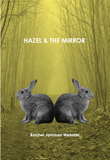Rachel Jamison Webster lives in Chicago and teaches poetry at Northwestern University where she is an artist-in-residence. She edits the online anthology of international poetry, UniVerse. For several years, she designed and taught writing workshops for city kids, and with them, she edited two anthologies of writing by young Chicagoans, Alchemy (2001) and Paper Atrium (2004). She earned her MFA in poetry from Warren Wilson College and received a Young Poets Prize from the Academy of American Poets. Her poems have been published in Poetry, the Paris Review, the Southern Review, the Madison Review, and other journals.
For Years, Caution Lay Its Warm Body Over Me
I was slow to rise, slow to wake. I thought I was dreaming my life. I thought it had already transpired like some Old Testament tale, its faces dusty and muddled, its parables terrible and difficult. I thought it was long past and some girl was reading it now, in her own remote future calling me an ancestor. I thought, once upon a time, I lived in Iowa, a female on a farm, back when time was still just a slow ripple through the fields, the skin, a gradual cycling of dusk and light.
How will I become real? I asked again and again. It seemed I needed to understand the roots of action. And so I read. Greeks and Romans, white men. According to Aristotle, there are three ways to plot a story.
- Borrow a traditional situation.
- Work backward from a climax.
- Work forward from an initial situation toward a climax.
I was woman with a husband and small child, which was the most traditional of situations. I could work backward from the moment of my birth, which is what had set my own mother in motion to leave, or I could work forward from the initial, traditional situation in which I found myself, but to do so would invite a climax, which is to say it would invite a kind of death. I realized then why people are more prone to reading stories than living them. Because every good story marks a rupture. It breaks you in half to become your death, which then becomes your life. What would become of me?
It seemed I would have to do all three.




